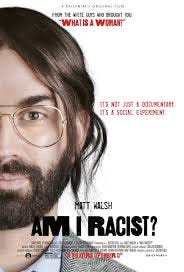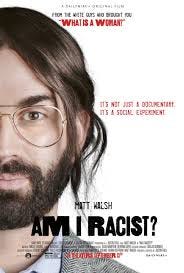Am I Racist?- Hilarious, but Fails to Answer the Most Important Question
Funniest movie of the year, by far. But it won't have the impact that What Is A Woman had, because it fails to answer the most important question.
On Thursday night, I went to see the new movie "Am I Racist?," the first theatrical release from The Daily Wire. First things first, this is the funniest movie I have seen in years. Matt Walsh is a master of keeping a straight face in hilariously awkward situations. In the movie, he poses as a DEI (diversity, equity, and inclusion) expert and gets interviews with some of the biggest names in the DEI industry (and yes, it's an industry… more on that later). Those he is interviewing don't know his true identity or profession, which leads to some of the film's best moments.
But if you come into this expecting it to be like "What Is A Woman," Walsh's film debut from 2022, you may be disappointed. Don't get me wrong, this film is a very similar format. Matt gets interviews with people who espouse a certain viewpoint, and he exposes how silly their viewpoints are. But this movie lacks a call to action.
In "What Is A Woman," about halfway through the movie, Matt Walsh starts talking to people who fight against gender ideology. He talks to doctors who sound the alarm on the ideology, researchers who expose the ugly origins of the ideology, and, most impactfully, transgender individuals who are filled with regret. The film, while hilarious in the first half, takes a flip and actively works against the ideology. He lays out exactly how the ideology is harmful, and the film stirs up feelings deep within you.
"Am I Racist" fails to do that. Instead of showing exactly how the ideology is harmful and sharing stories that will make your heart ache, Matt instead becomes a DEI ideologue and takes the ideology to its logical conclusion. To be fair, it makes the movie far more funny. But it doesn't land the impact that What Is A Woman does.
Now, the pieces are there to make a huge impact. One of the themes throughout the film is how much money the DEI experts are making. Every new interview he does, they show us how much they had to spend in order to secure the interview. For example, Robin DiAngelo, the author of "White Fragility," was paid $15,000 for their interview. In the end, when Matt is a full-blown DEI professor, he quits after he realizes that the whole thing is a scam. It's a scam because DEI has become a true industry, with people who speak nonsense making thousands of dollars for every speaking appearance they make. The money involved is eye-opening and one of the things that every person should take away from the film.
Another impactful piece is the ordinary people Matt talks to. Along with speaking to the DEI ideologues, he also speaks to normal, everyday people who know nothing about DEI. He speaks to people in a small-town bar and an immigrant to America who has built himself an auto shop business. The difference between what ordinary people think and what the ideologues believe about race is startling. It becomes clear that the everyday person is ready to be nice, friendly, and love their neighbor. But the ideologues, in their obsession over race, end up treating people differently strictly because of their race, and many times, becoming overtly racist towards white people.
Matt also talked to a few everyday people who have bought into the DEI ideology. While the dichotomy between the people in the bar and the experts was startling, the most impactful part of the film comes in the difference between the people in the bar and the everyday people who have bought into the DEI ideology. The people in the bar, as said before, are kind. They are upset at Matt's questions because it makes no sense why race is so important. They have no problems with people of different races. Whereas the everyday people who have bought into the DEI ideology are filled with hate. I don't want to say too much, but they are far too willing to put down someone who supposedly once said a racial joke over a decade ago. Seeing them makes you wonder how far this ideology has spread and how deep it has seeped into society. You also may ask yourself how DEI affects the everyday people, those minding their own business in the bar. Which is exactly where this movie is lacking.
Unlike "What Is A Woman," this movie does not answer the question of how this ideology affects you. Sure, we have all heard of DEI, and we all know that companies have DEI departments, but how does this affect me? Why can't I just ignore the DEI stuff at work? Does the DEI stuff really harm anybody? Why would I cause issues with my employment, or with my university, about something like this? All of those questions are left unanswered.
"What Is A Woman" showed us the harmful impact of gender ideology. It showed us how the ideology has started to find its way into schools—from elementary schools to universities. It showed how social media has led to the proliferation of the ideology and how our kids can be affected without us ever knowing. It was, to put it mildly, scary. The lasting feeling you had when the movie ended was fear. Fear for the future, fear for the institutions indoctrinating the next generation, and fear for your own children. The lasting feeling from Am I Racist is humor.
To be fair, this movie was advertised as a comedy. And The Daily Wire delivered on creating a comedy. It's hilarious. Answering the questions that I wanted answered would have taken it away from its comedic intent. I was wrong to expect anything other than to laugh. But you and the Daily Wire should know that this movie will not have the same impact that What Is A Woman had. This will not lead to a massive, lasting fight against DEI. It may lead to a temporary increase in the fight against DEI (which has already begun), but it won't be the film that people point to as the leading piece in the battle against DEI.
To sum up, it's a funny movie that delivers on its promise. But it fails to answer the most important question—why does this matter to me?




